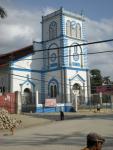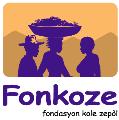Envisioning a New Jacmel
 Trade is more important to Haiti’s future than aid. This includes agricultural revitalization, industrial development, and perhaps growth in the tourism sector. Jacmel, Haiti’s city of art, has always been one of its most appealing cities. While the city took serious damage during the earthquake, the Capponi Group and the Jacmel Advisory Council are collaborating in the development of Jacmel's downtown, including the construction of a hotel. At the same time, Yele has committed to developing Jacmel’s first tourism training school. Concept art and video can be found on the Capponi Group website. Additional information follows.
Trade is more important to Haiti’s future than aid. This includes agricultural revitalization, industrial development, and perhaps growth in the tourism sector. Jacmel, Haiti’s city of art, has always been one of its most appealing cities. While the city took serious damage during the earthquake, the Capponi Group and the Jacmel Advisory Council are collaborating in the development of Jacmel's downtown, including the construction of a hotel. At the same time, Yele has committed to developing Jacmel’s first tourism training school. Concept art and video can be found on the Capponi Group website. Additional information follows.





